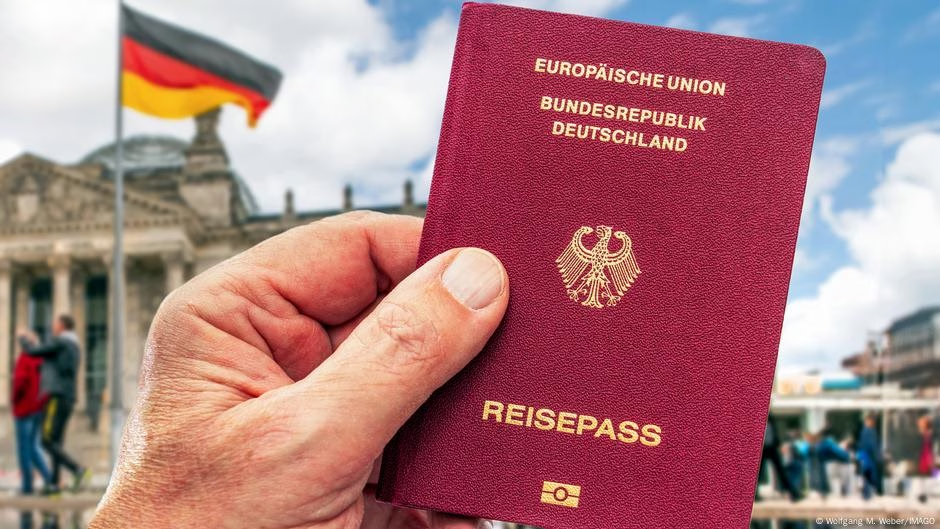A document intended to serve as the foundation for the new federal government’s coalition agreement has been drafted and reviewed by DW. Under the section titled “Citizenship law,” the document states: “We are committed to the reform of citizenship law.” It then continues:
“We will examine under constitutional law whether we can revoke the German citizenship of terror supporters, antisemites, and extremists who advocate for the abolition of the free and democratic basic order, if they hold another nationality.”
SPD politician Dirk Wiese, part of the working group responsible for “Domestic Affairs, Law, Migration and Integration,” hailed this as a success for his party. Wiese informed DW that the SPD ensured dual citizenship remained an option, contrary to the CDU/CSU’s wish to revoke it. “We still have the possibility of naturalization after five years. If you come to the country very quickly and learn the language within three years.”
The CDU/CSU’s proposal to withdraw German citizenship from dual nationals under certain circumstances was met with resistance from the SPD, but the party apparently could not prevail on this issue. Some Social Democrats fear this proposal could lead to unequal treatment, raising questions about whether naturalization might act as a probationary period and whether Germans with a second nationality are truly German after all.
Germans on trial?
SPD politicians, such as Mayor of Bremen Andreas Bovenschulte, expressed concern about this proposal in an exploratory paper before negotiations. He called it “a very big problem” for the roughly five million dual nationality holders in Germany. “They would get the impression that their citizenship is worth less — and that they don’t really belong,” he told Der Spiegel.
This sentiment applies to “Abdel,” a Berliner with Palestinian heritage, who holds both German and Jordanian citizenship. He expressed concern about the proposal’s implications. (DW uses a pseudonym here, as “Abdel” feels unsafe having his real name published.)
Clara Bünger, a Left Party member of the Bundestag, calls this proposal a “two-class citizenship law” that could divide who truly belongs in a migration society. She advocates for clear rules, legal certainty, and equal rights for everyone in Germany.
‘Terrorist’ becomes ‘terrorist supporter’
The Basic Law of Germany generally prohibits the withdrawal of German citizenship; however, there are exceptions. Under current law, German passport revocation is possible for individuals fighting for a terrorist organization like the Islamic State (ISIS), but only if they possess another passport.
During the German federal election campaign, the CDU/CSU repeatedly demanded stricter regulation. In January, CDU/CSU’s chancellor candidate Friedrich Merz proposed deporting dual nationals who commit crimes. Shortly after, CSU head Markus Söder called for the removal of dual citizens advocating for a caliphate.
The proposal now clearly bears the CDU/CSU marks. Being identified as a “terrorist supporter” or “antisemite” in the future may suffice to revoke German nationality. But what do these terms mean?
Antisemitism in itself is not a criminal offense in Germany; it must meet the criteria of incitement to hatred, which applies to many antisemitic statements, including Holocaust denial.
Critics argue this is disadvantageous for dual nationals compared to Germans who express antisemitic views and hold only a German passport.
Who is an ‘antisemite’?
Elad Lapidot, a professor of Jewish studies at the University of Lille, is concerned about the likely next German government’s plans. He worries partly because the Bundestag recently reaffirmed the use of the IHRA working definition of antisemitism by the International Holocaust Remembrance Alliance as a benchmark. The definition, which includes eleven examples of antisemitism, can be interpreted quite broadly.
Critics of the IHRA working definition, including researchers like Lapidot, have themselves been labeled “antisemites.” Lapidot, co-founder of the Association of Palestinian and Jewish Academics, argues, “You don’t have to agree with the criticism. But formulating and expressing it is essential for a democracy.”
German citizenship withdrawal and the Nazi regime
Lapidot is also personally concerned. As a holder of both German and Israeli citizenship, his family originally emigrated from Hamburg to the British Mandate of Palestine in 1934. Many German Jews fleeing the Nazis were stripped of their citizenship upon leaving. Lapidot sees the current discussions as reflecting similar notions of second-class citizens.
“Germany already created second-class citizens at one time, then withdrew their citizenship.”
Lapidot’s German citizenship is a form of compensation for this historical injustice.
The influence of far-right populism?
The rise of the far-right AfD, some parts of which are under surveillance for suspected extremism, is of significant concern to Lapidot. He sees drawing parallels between today’s Antisemitism and the Nazi era as “cynical and extremely disturbing.” Antisemitism, as a genocidal ideology, has never truly disappeared from German society.
Left Party politician Bünger believes the coalition proposal is influenced by the far-right, making such policies possible under pressure from the right. “Abdel,” a frequent participant in pro-Palestinian demonstrations, may consider giving up his Jordanian citizenship to maintain his German citizenship. He sees the potential revocation as a suppression of freedom of expression, asserting he is not an antisemite.
Constitutional review still pending
It remains unclear who will decide whether someone is an “antisemite” and could potentially be stripped of their dual citizenship. The draft paper sets the criteria as “Supporters of terrorism, antisemites, and extremists who call for the abolition of the free democratic basic order.”
Felix Klein, the federal government’s antisemitism commissioner, refused to comment on the draft, citing its preliminary status. The paragraph in question must undergo a constitutional review to determine whether individuals can be considered “supporters of terrorism, antisemites, or extremists.”
The SPD seems optimistic regarding the draft’s legal standing. Dirk Wiese, an SPD negotiator, remains relaxed about the draft’s legal implications. However, those potentially impacted are far from sure.
This article was originally written in German.








